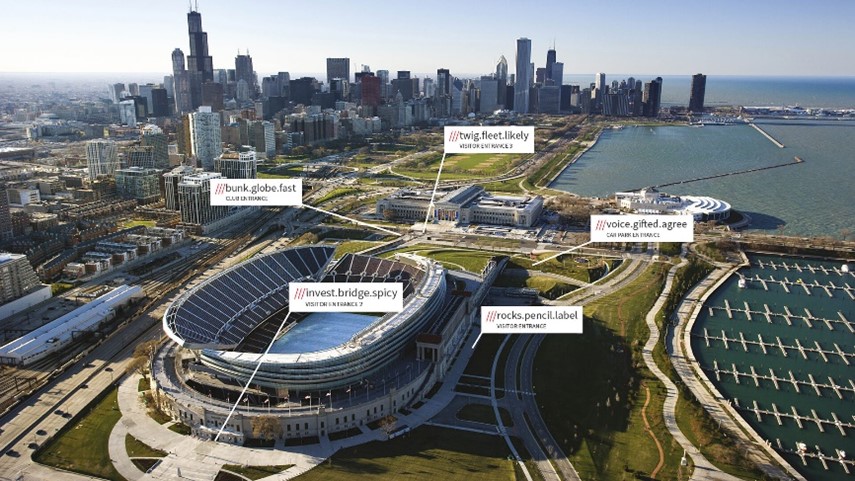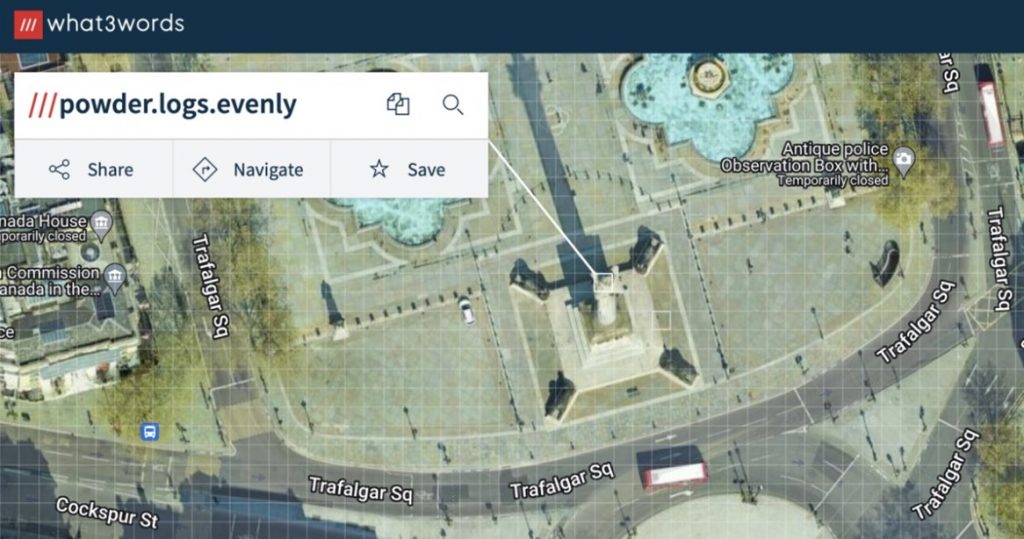three.little.words

Did you know that the world can be split into a grid of 57 trillion 3-by-3-metre squares?
And did you know they can all be identified by a unique combination of just three words?
Well, you do now, and if you want to use the brand, it’s called appropriately enough “What3words”.
So, if you happen to want to meet on the top of Nelson’s Column in Trafalgar Square all you need to know is it’s powder.logs.evenly

From humble beginnings, what3words is now being used to save injured hikers in the middle of the mountains and to precise target remote forest fires. It’s being used by over 80% of Britain’s emergency services, including the Metropolitan Police and London Fire Brigade as well as many international emergency services including the Los Angeles Fire Department. It helps people find each other (and even their tent) at festivals. It’s a godsend for delivery drivers. It was fitted into Mercedes A-Class cars when they launched in May 2018. It has now become the main navigation system for new cars in India because it is more reliable than local maps which can be vague and have confusing street addresses.
What3words also provides addresses for places where traditional addresses are non-existent, such as Brazilian favelas, and in Mongolia, where about a quarter of the population is nomadic. Not surprisingly, the Mongolian Post Office has begun using What3Words instead of house numbers and street names.
The origins of the brand start, as many brands do, with a problem.
Chris Sheldrick used to work in the music industry, organising live events around the world. However, he was continually having problems with getting the right people and equipment, to the right places. Bands, musicians and instruments getting lost trying to find remote events was pretty common.
Chris often talks about one particularly bad day when a driver in Italy unloaded all the equipment at a venue an hour north of Rome… instead the right venue which was an hour south of Rome. He remembers another occasion when a keyboard player called him and said, “Chris, don’t panic, but we may have just sound-checked at the wrong wedding”.
He figured that there had to be a better way, something that would be easier than trying to remember a long GPS reference and avoid the problems that arose if you got just one number wrong.
Having identified the problem he decided he needed some help to solve it.
He first approached a mathematician friend, Mohan Ganesalingam. Ganesalingam not only had the idea of dividing the world into three-metre squares but also created the first 3-word address algorithm on the proverbial “back of an envelope”.
They then approached another school friend, Jack Waley-Cohen, who was a linguist with a background in translation. Waley-Cohen suggested the use of memorable words and provided help on how to translate them. This was going to be key as the translations would not always be direct, as direct translations to some languages could produce more than three words.
Three friends and what3words was born. It was incorporated in March 2013

The first attempt at monetarization was selling “OneWord” addresses – namely the ability to brand a location with a word or character string of the buyers’ choice. It had to be between six and 31 characters, and could include letters, numbers and hyphens. These would be stored in a database for a yearly fee.
After a good start, when they managed to sell more than 10,000 OneWords in its first week, growth wasn’t as fast or strong as they hoped and the offering was soon discontinued.
The brand switched to a business-to-business model and started targeting logistics companies, post offices, and couriers, though emergency services and many NGOs would be allowed to use it for free.
Firms that signed up could utilise what3words as part of their in-car navigation systems. For example, drivers can enter their destination simply by saying three words, without looking at the display, reducing any distraction and improving road safety.
Clients include Mercedes-Benz, Ford, the AA and Addison Lee, and delivery/ e-commerce platforms such as Evri and BJS, and the service is now available in 193 countries. Though still relying on venture capital, the brand is growing rapidly and exploring new avenues, for example signing an investment deal with British broadcaster ITV
It is also encouraging businesses to tag their outlets

UK adman Rory Sutherland described it in a piece in The Spectator as “The best navigation idea I’ve seen since the Tube map” and a partner Bosch sums up its benefits brilliantly as safer.smarter.faster (now where in the world is that?)
The moral: The best brands solve problems whilst recognising that specific problems in one sector often occur in many other ones too.